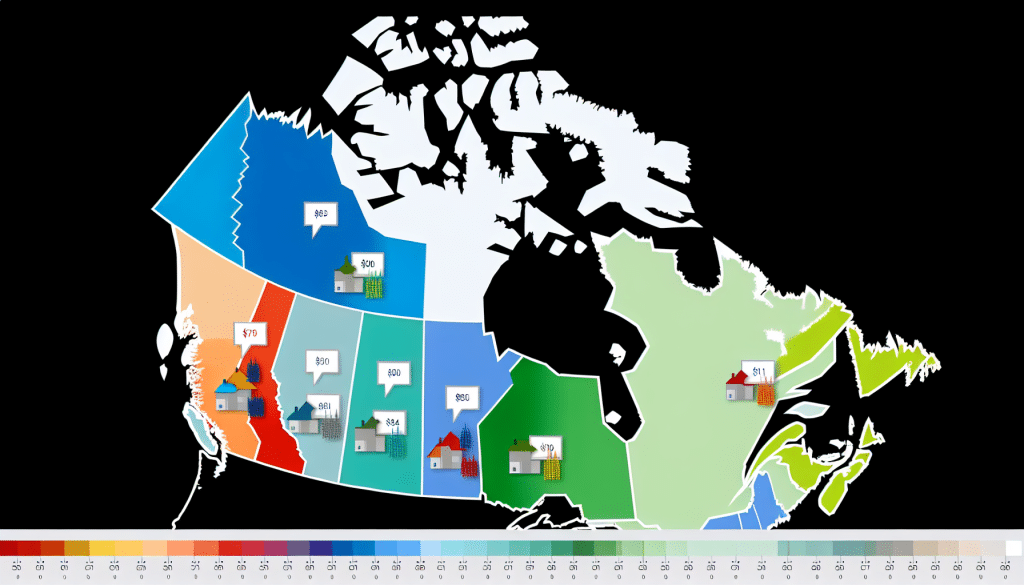Canada has always been one of the world’s most desirable destinations to move to. With its high standard of living, stunning landscapes, and diverse culture, the attraction is clear. But for newcomers, students, and even Canadians considering a cross-provincial move, the first question is often the same: how much does it cost to live in Canada?
The truth is, the answer depends heavily on where you choose to live. Canada’s vast geography and regional economies mean that the cost of living differs greatly between provinces and cities. From the bustling hubs of Toronto and Vancouver to quieter prairie towns or Atlantic communities, the price of living ranges from manageable to overwhelming. Let’s break it down.
Housing: The Biggest Unknown in Canadian Cost of Living
Housing tends to be the single largest expense, and nowhere is this more evident than in major cities like Toronto and Vancouver. Both cities rank among the most expensive real estate markets not just in Canada but globally. A downtown Toronto one-bedroom apartment can easily exceed $2,400 CAD per month, with Vancouver not far behind.
Move beyond these metropolitan centers, however, and the contrast is striking. Smaller cities like Kingston in Ontario or Moncton in New Brunswick offer far lower housing costs. The trade-off is often fewer job opportunities in specialized sectors, though remote work is helping to close that gap for many professionals.
Groceries and Food Costs
Food prices in Canada also vary widely and are influenced by geography. In provinces where food must be transported long distances—such as Newfoundland and Labrador or the northern territories—groceries are noticeably more expensive.
On average, one person can expect to spend $300–$450 CAD per month on groceries, depending on habits and location. Eating out adds up quickly. A casual restaurant meal might cost $20–$25 CAD per person, and prices rise in larger cities such as Montreal, Toronto, or Vancouver, where the culinary scene is vibrant but costly.
Transportation: Vehicles, Transit, and Gas Prices
Transportation expenses also depend on where you live. In larger cities like Toronto, Vancouver, or Montreal, public transit is widely used and relatively affordable, averaging $120–$160 CAD monthly for a pass.
In smaller cities and rural communities, however, having a car is almost essential. Gasoline prices differ by province: British Columbia has some of the highest, while Alberta’s are notably lower due to reduced taxation. Insurance premiums also vary, with Ontario and British Columbia often topping the list for the most expensive car insurance in the country.
Highlight on Alberta: Saving Money and Daily Expenses
When people weigh the cost of living across Canada, Alberta often emerges as one of the most balanced provinces. Calgary and Edmonton in particular offer diverse job markets—from energy and construction to tech and healthcare—combined with housing that remains far more affordable than in Toronto or Vancouver.
For example, the Edmonton cost of living is frequently cited as one of the most reasonable among Canada’s major cities. A one-bedroom apartment in downtown Edmonton rents for around $1,300 CAD per month—roughly half the cost of the same unit in Vancouver. Utilities, groceries, and transportation expenses are also moderate, making the province attractive to both families and newcomers.
Another advantage is income. Average wages in Alberta tend to be higher than in many other provinces, and with no provincial sales tax, residents keep more of what they earn. This mix of affordable housing, competitive wages, and lower day-to-day costs explains why Alberta continues to attract both domestic migrants and international arrivals.
Healthcare, Childcare, and Education
Healthcare is another major factor in the Canadian cost of living. Canada’s publicly funded system relieves families of many expenses compared to countries without universal healthcare. That said, not everything is covered. Dental work, prescriptions, and vision care often require private insurance or employer benefits.
Childcare, however, can be one of the steepest costs families face. In cities like Toronto and Vancouver, full-time daycare can exceed $1,200 CAD per month. Federal and provincial initiatives are working toward more affordable childcare, with the long-term goal of $10-a-day programs, but availability and costs remain inconsistent across the country.
Post-secondary education also adds to the financial picture. Domestic tuition averages around $6,800 CAD annually, while international students face far steeper costs, often upwards of $30,000 CAD per year.
Regional Differences to Consider
One of the most fascinating aspects of Canada’s cost of living is how drastically it can shift between provinces:
- British Columbia: Breathtaking scenery, but expensive housing and higher fuel prices due to taxes.
- Ontario: Home to Toronto and Ottawa; housing is expensive in big cities but much more affordable in smaller towns.
- Quebec: Generally lower housing costs and heavily subsidized childcare, though residents face unique tax structures.
- Atlantic Provinces: Housing is more affordable, but wages are often lower and groceries more expensive due to shipping costs.
- Prairie Provinces (Alberta, Saskatchewan, Manitoba): Affordable housing and good job markets, though economies are more vulnerable to shifts in resource prices.
Conclusion
The short answer: it can be—but it depends on where you choose to live and the lifestyle you want. Major metropolitan areas like Toronto and Vancouver demand much higher incomes to keep up with soaring housing costs. By contrast, mid-sized cities such as Calgary, Edmonton, Halifax, or Winnipeg strike a healthier balance between affordability and quality of life.
For those willing to settle outside Canada’s busiest hubs, the trade-off is usually lower housing costs and a slower pace of life. With remote work on the rise, these areas are becoming more realistic and appealing options.
